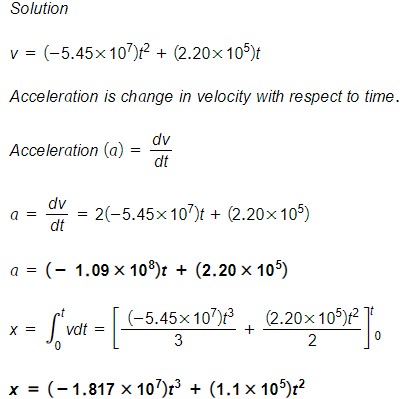An antique rifle fires 9 mm bullets such that as they travel down the barrel of the rifle their speed is given by v = (−5.45 ✕ 107)t2 + (2.20 ✕ 105)t where v is in meters per second and t is in seconds. The acceleration of the bullet just as it leaves the barrel is zero. (a) Determine the acceleration (in m/s2) and position (in m) of the bullet as a function of time when the bullet is in the barrel. (Use the following as necessary: t. Round all numerical coefficients to at least three significant figures. Do not include units in your answers. Assume that the position of the bullet at t = 0 is zero.) a(t)= ? m/s2 x(t)=? m (b) Determine the length of time the bullet is accelerated (in s). = ? s (c) Find the speed at which the bullet leaves the barrel (in m/s). = ? m/s (d) What is the length of the barrel (in m)? = ? m
Displacement, Velocity and Acceleration
In classical mechanics, kinematics deals with the motion of a particle. It deals only with the position, velocity, acceleration, and displacement of a particle. It has no concern about the source of motion.
Linear Displacement
The term "displacement" refers to when something shifts away from its original "location," and "linear" refers to a straight line. As a result, “Linear Displacement” can be described as the movement of an object in a straight line along a single axis, for example, from side to side or up and down. Non-contact sensors such as LVDTs and other linear location sensors can calculate linear displacement. Non-contact sensors such as LVDTs and other linear location sensors can calculate linear displacement. Linear displacement is usually measured in millimeters or inches and may be positive or negative.

Trending now
This is a popular solution!
Step by step
Solved in 3 steps with 3 images









